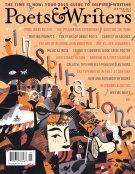It has been quite a turnaround. In December 2013, the National Poetry Series (NPS), which for thirty-five years had been one of the most well-known publication prizes for emerging poets, was in danger of shutting down due to lack of funds. Then founder and organizer Daniel Halpern got a call from Camille Lannan, the director of the Lannan Foundation’s literary program, which supports writers and literary organizations through grants, fellowships, events, and residencies. She not only wanted to help keep the long-running prize going, but also to increase its modest thousand-dollar honorarium tenfold. “Publication and ten thousand dollars?” says Halpern. “It’s a dream.” The series will continue to administer five annual awards for poetry collections, each of which includes publication by a participating press, as well as the more recently established Paz Prize, given biennially for a book of poetry originally written in Spanish.
The NPS traces its roots back to 1975, when Halpern, a poet, teacher, and publisher, gave a speech at the Library of Congress lamenting the difficulty of getting good poetry into the hands of readers. The novelist James Michener read Halpern’s remarks and immediately offered to help, saying that the discrepancy between publishers’ attitudes to fiction and to poetry was “deplorable.” The first contest, held in 1979, placed a premium on publication rather than money. “It always seemed to me that the most important thing you could have is a book of poems published,” Halpern says, “because then you get teaching jobs, you get readings, you build a reputation, and you start a career.” The NPS works with five publishers—two trade houses, one university press, and two rotating small presses (recent partners have included Coffee House Press, Fence Books, and Milkweed Editions)—and covers a portion of publication costs. Many notable poets, including Billy Collins, Stephen Dunn, Mark Doty, Marie Howe, Nathaniel Mackey, Terrance Hayes, and Adrian Matejka, have published poetry collections through the NPS.
The other founding principle of the NPS is its selection system, through which five judges each choose one winner. Halpern believes this system is more effective than judging by committee, which he says has a tendency to create “a kind of planing effect…. You knock off the top and the bottom” and too often the result is an overcautious middle range that excludes riskier choices. But in such a small world, where so many poets teach and meet younger poets, individualized judging carries its own hazard of nepotism. To minimize that, a team of readers narrows down the initial pool of submissions and then sends thirty to fifty manuscripts—all anonymous—to the five judges. After that, it’s a question of trust. “You hope someone’s not going to pick his or her own student, because once the book comes out, it will be clear—the name of the poet who selected the book is on the front cover.” Halpern says there hasn’t been a problem so far, and that “you usually hear pretty quickly if something like that has happened.”
The benefits for poets clearly outweigh the risks. According to 2012 winner Sasha West, “The NPS is unique for its breadth of presses and judges—and ultimately, its breadth of writers.” West’s debut collection, Failure and I Bury the Body, was published in 2013 by a major trade house, which brought her an audience beyond the poetry community. “I teach in a public-policy school, so publishing through Harper Perennial has made my book visible to my colleagues (and my non-poetry-reading relatives) in a different way.”
With its newly increased monetary award, the NPS prize becomes even more of a game changer for poets. Most other poetry publication prizes offer monetary awards from one to three thousand dollars—American Poetry Review’s coveted Honickman First Book prize, for example, offers three thousand dollars—or various nonmonetary benefits. The Yale Series of Younger Poets award doesn’t offer the winner money as part of the prize, but rather a writing fellowship at the James Merrill House. Other prizes, however, are keeping pace with the NPS—the Academy of American Poets recently revamped its Whitman prize to include a six-week residency in Italy, an all-expenses-paid trip to New York City, and publication with Graywolf Press along with five thousand dollars.
For the 2015 competition, the National Poetry Series will accept submissions from January 1 through February 15. Winners will be announced next fall. In the meantime, Halpern will still be celebrating the revival of his series: “It’s one of the most generous things I’ve seen—and I’ve been publishing poetry for forty years,” he says of the grant. “It’s great for the poetry community.”
Joanna Scutts is a writer and critic in Queens, New York. She is on the board of the National Book Critics Circle and reviews nonfiction and literary fiction for several publications, including the Washington Post, the Nation, and the Wall Street Journal. Her website is joannascutts.com.








